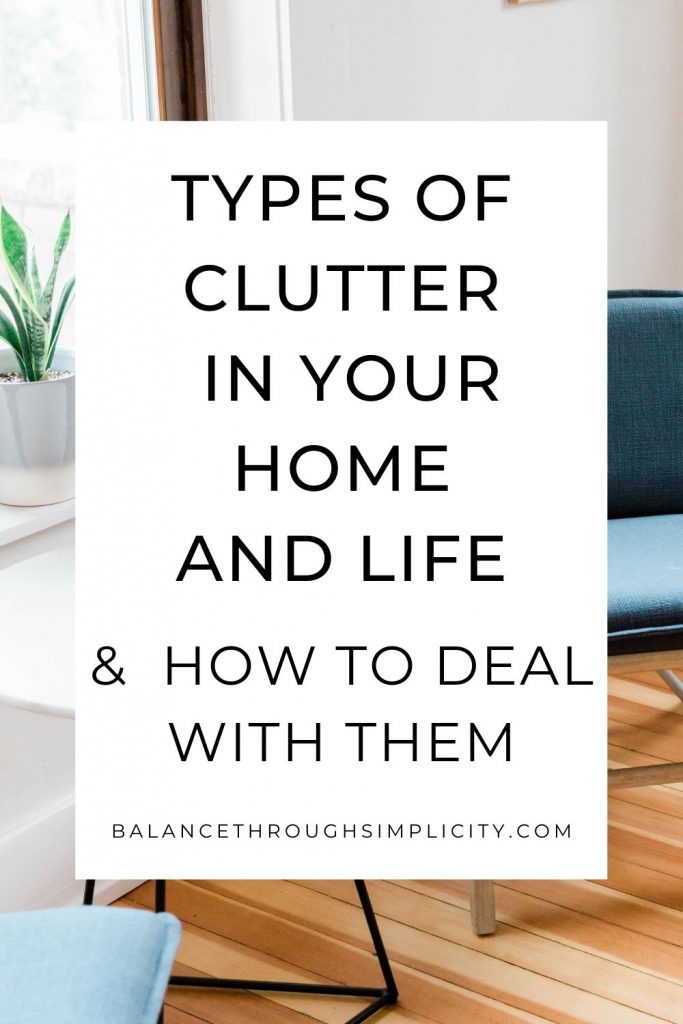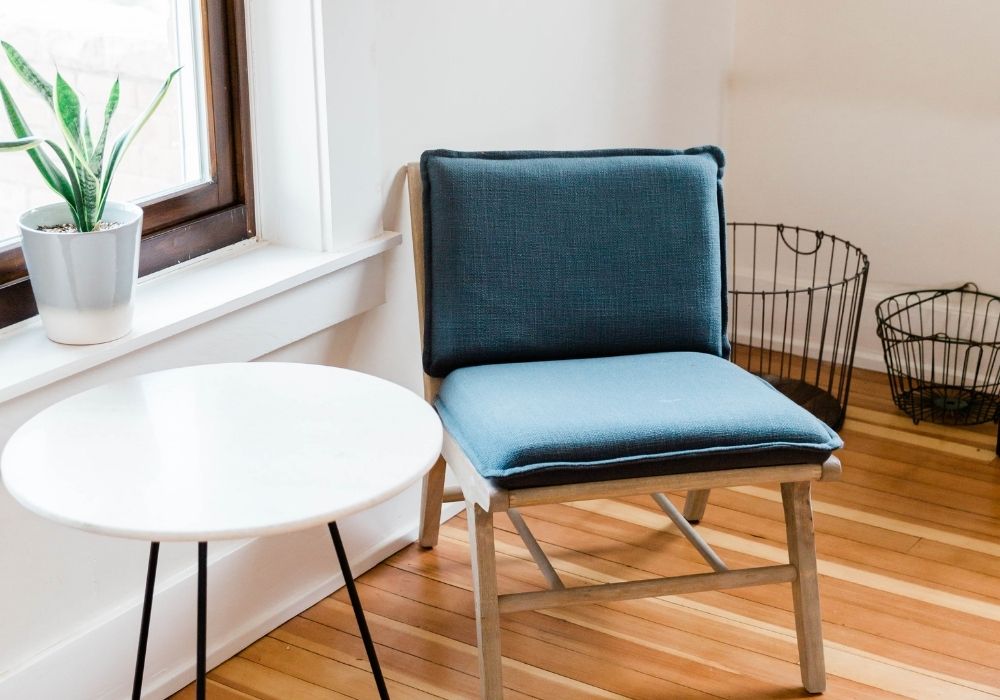TYPES OF CLUTTER AND HOW TO DEAL WITH THEM
Struggling with clutter? Let’s look at the different types of clutter in our homes and lives and how to deal with them.
THE DIFFERENT TYPES OF CLUTTER
I talk a lot about clutter and how to get rid of it by decluttering your home and simplifying your life. I thought it might be helpful to look at the different types of clutter that we come across throughout normal busy, everyday life. And, give you some quick tips on how to deal with them! There are links to extra resources and articles that I think might be helpful if you’re particularly interested in a type of clutter!
It’s not an exhaustive list but I hope it gives you a few ideas so you can start to think what clutters your own life and some ways you can begin to tackle that clutter and keep it away.
WHY DOES CLUTTER MATTER
Before we look at the different types of clutter in our home and life, and how to deal with them, I thought it might be helpful to explore why clutter matters.
Clutter has been shown to increase our stress levels and reduce our focus and concentration. Although there are many scientific studies to back this up, many of us would agree that a messy, cluttered environment correlates to a messy, cluttered mind.
I know I, for one, work better when my desk is clear, clean, tidy and set up to help me work in the most efficient way possible. I like my kitchen to be the same. Easy to clean with plenty of work space and tidy cupboards and drawers so I can find the ingredients and cooking utensils I need.
A decluttered home is often tidier, calmer, more organised and easier to keep clean and tidy. A decluttered life has other related benefits and gives us more time, space and freedom for living our life instead of chasing here and there just to keep up with it.
So, if a cluttered home and life is making you stressed out, over-tired and in search of something else, take a look at these different types of clutter to see if any resonate with you.
TYPES OF CLUTTER AND HOW TO DEAL WITH THEM
Here are some different types of clutter and how to deal with them.
1. Physical clutter
This type of clutter is stuff in your home. From too many plates and glasses to too many clothes in your wardrobe, too many toys in your child’s bedroom to too many extra sets of towels and bedlinen. Too many duplicates, too many missing pairs, too many things that you don’t need, want, use or particularly appreciate. Here are some tips on how to declutter the physical clutter in your home.
- Plan your attack
- Decide what to keep and what to get rid of
- Know what to do with your unwanted items
- Maintain daily habits for a clutter-free home
2. Time clutter
This type of clutter is clutter in your schedule or filling up your days. It could be too many errands on your to do list, too many activities in your diary, saying yes to too many invitations. It could be not enough free time for yourself, unstructured free time for your kids. It could be burning the candle at both ends to complete your work whilst juggling everyday life. Here are some tips on how to declutter your schedule and be less busy.
- How to be less busy
- Signs you are too busy and what to do about it
- How to be more productive
- Things that waste your time during the day
3. Noise clutter
This type of clutter is clutter that invades your quiet and calm. It could be too many lit up TV screens or music blaring that you don’t like. It could be the pings, alerts and notifications popping from your phone. It could be arguments at home because you’re stressed out and shouty with each other. It could be your phone ringing in the evening when you’re trying to unwind and relax and get ready for a peaceful night’s sleep.
Further reading: How to create a calm, peaceful family home.
4. Digital clutter
This type of clutter is clutter on your computer and on your phone. It could be too many emails in your inbox, junk popping into your spam folder or newsletters that you signed up to which you no longer read. It could be millions of fuzzy photos on your phone that make finding those favourite snapshot memories feel like trying to find a needle in a haystack. It could be too many apps on your phone you don’t use or cables, wires and remote controls that you can’t remember what they’re for. It could be files and folders on your desktop that aren’t labelled or organised.
Further reading: Here are some tips on decluttering your digital clutter.
5. Mental clutter
This type of clutter is clutter that takes up space in your mind. It could be negative thoughts, worries, stresses and limiting beliefs. It could be too many things to remember, or an overloaded brain that can’t focus and concentrate. It could be too many distractions or too many ideas that don’t have an outlet. It could be fears, anxieties, what if’s, perhaps and maybes.
Further reading: Here are some tips to declutter your mind.
6. Paper clutter
This type of clutter is clutter that arrives through your letterbox as junk mail, or letters from school or bills from the electricity company. It could be newsletters, magazines and flyers. It could be receipts and bank statements, certificates and records of your child’s achievements. It could be those piles sitting on your kitchen counter waiting to be actioned, the pile of mail sitting on your hall table waiting to be sorted, even the recycling waiting to be put out. Paper clutter that needs to be dealt with, scanned, completed, filed, shredded or thrown. It might also be art and craft projects and you’ll need to declutter craft supplies too!
Here are some tips for dealing with paper clutter:
- Set up a filing and storage system
- Scan or save digitally as much as you can
- Action incoming paperwork there and then
- File your paperwork to be kept regularly so it doesn’t build up
Further reading: How to declutter paperwork and feel less overwhelmed by paper clutter.
7. Sentimental clutter
This type of clutter is clutter that brings back memories and has true emotional connection. It could be baby clothes from when your kids were little, old family photos that remind us of those we’ve lost. It could be your wedding dress or jewellery that’s been passed down through the generations. It could be artwork your child created as a toddler, old serving dishes that we remember our grandmother using for the roast on Sundays. This type of clutter is particularly difficult to part with and many of us struggle.
Further reading: Here are some tips on decluttering sentimental items.
8. Gift clutter
This type of clutter is gifts from others that you didn’t choose or don’t particularly want cluttering up your home. You may be very grateful for their generosity and kind thoughts and this makes it difficult to get rid of the items without feeling ungrateful or guilty. Just because you received the gift doesn’t mean you have to keep it.
- Say thank you unreservedly, then…
- Donate, recycle or gift it to a friend
9. Stuff that doesn’t have a home
Give everything you own a home. This is a place that the item can be stored in when not in use. If it doesn’t have a home, it’s likely to be left out taking up space and cluttering up the floor or a surface. Give things a home and let all your family know where that home is so they can put it away after use.
10. Financial clutter
This type of clutter is debt, too many store and credit cards, too many unwanted subscriptions coming out of your bank account. This is money and financial clutter. Take steps to simplify your finances:
- Work out your monthly income and expenditure
- Create a budget for all expenses and stick to it
- Identify debt and a plan to pay it off
11. Rubbish and recycling clutter
One of the most easily dealt with types of clutter but clutter nonetheless! Empty and take out the bins regularly.
12. Aspirational clutter
This type of clutter could be goals that don’t align with what you want but you spend money, time and energy pursuing them. It could hobbies that you think you should be interested in but you’re not and the things you bought to support those hobbies are unused (exercise equipment anyone?!). It could be craft supplies you no longer use, reference books for studying that lie untouched.
Be honest with yourself and don’t be afraid to admit that you’re no longer chasing old aspirations that don’t serve you anymore. It’s ok to change your mind. Learn from past experience and if you’re taking up a new hobby, start small until you know it’s something you’re going to keep up and be enthusiastic about.
13. Expensive clutter
The more something costs, the more we often feel reluctant to get rid of it, even if we don’t use it. For me, the true waste in a costly purchase comes about when we buy the item in the first place, not when we get rid of it. Be mindful of your shopping habits and spend money wisely. You don’t want expensive clutter to end up just taking space in your cupboards reminding you of how much money you spent every time you look inside. Go shopping if you want to but shop mindfully!
14. Freebie clutter
Just because something is free doesn’t mean it deserves space in your home.
15. Bargain clutter
Just because something is a bargain doesn’t mean it deserves space in your home either! You may have seen something in the sales, but would you have bought it if it was full purchase price? Maybe you bought an item in bulk because it was cheaper but do you really need to stockpile? A bargain is only a bargain if you were going to buy it anyway.
16. Seasonal clutter
A great example of seasonal clutter is the Christmas clutter of trees, decorations, gift wrap, food and drink. Although it doesn’t last for long, and it’s lovely whilst it does, festive clutter certainly takes up a lot of space! Think about ways you can reduce seasonal clutter if you’d like or just enjoy it for the short time it’s there.
17. Hidden clutter
Hidden clutter is stuff in your cupboards, drawers, under the bed, lurking in your inbox and more. It’s clutter that isn’t visible or doesn’t get in your way on a daily basis. Yet, it still takes up space in your home, heart and mind. Try these tips on how to identify hidden clutter and how to tackle it!

RESOURCES ON DECLUTTERING
I hope you found this article helpful and you now have a clearer insight into what might be cluttering your own home. Here are some other decluttering resources to help clear your clutter and keep it away!
- How to declutter your home and life – a roundup of decluttering tips, advice and resources
- Benefits of decluttering – powerful reasons to declutter your home
- Reasons to declutter your home
- What to do if no-one else in your home wants to declutter
- How to declutter when you don’t have time
- Simplify Your Home – a guide and workbook to help you declutter your home, room-by-room. With checklists, further reading and lots of actionable steps and prompts to help you understand WHAT clutters your home, WHY it’s there and WHAT to do about it.

